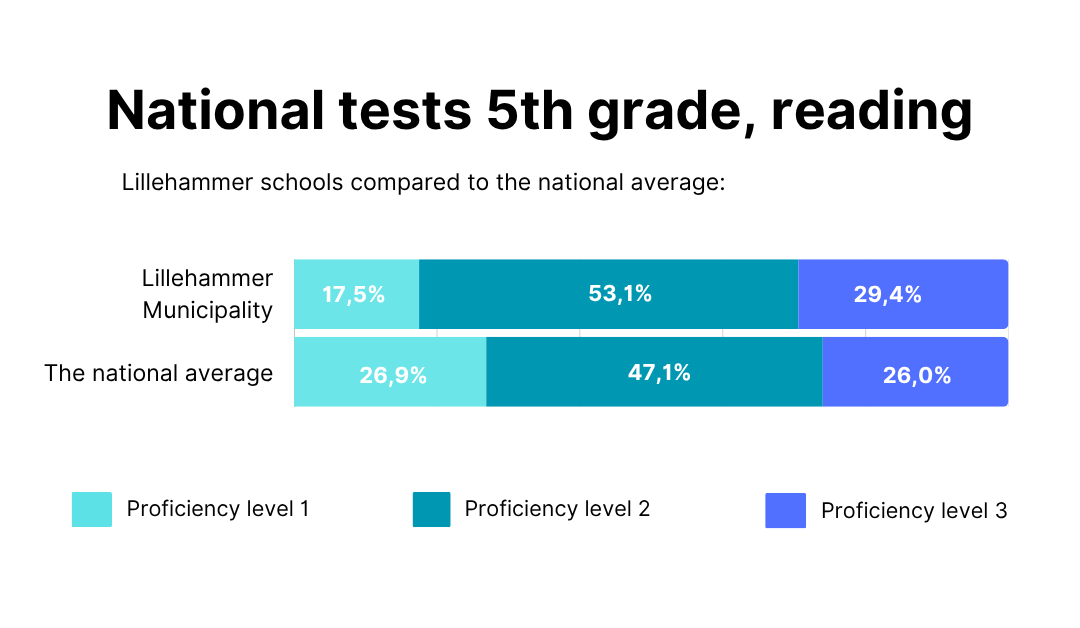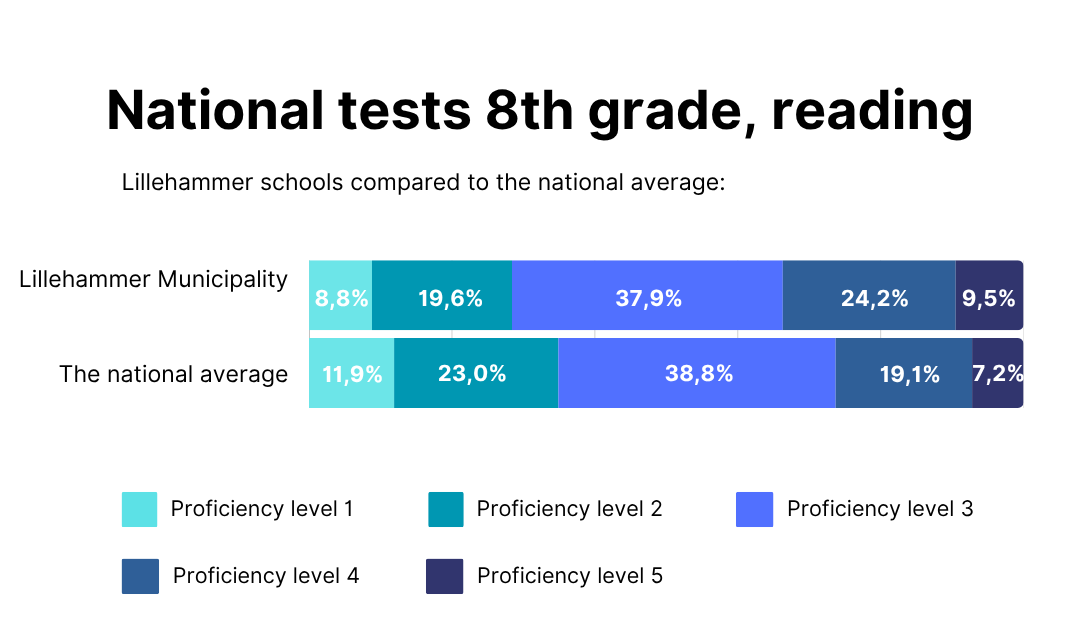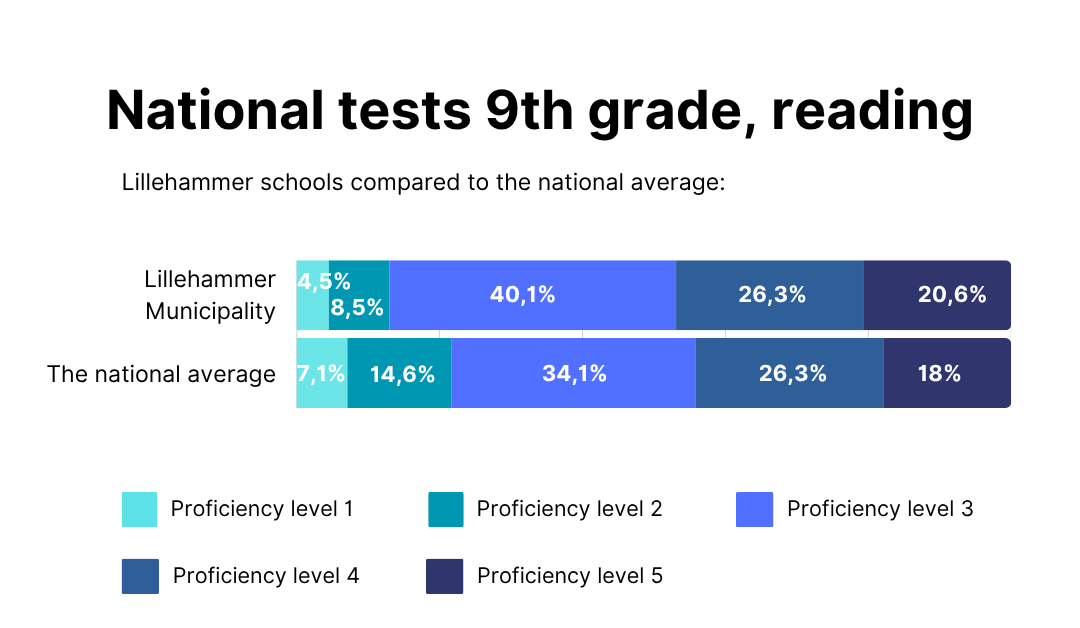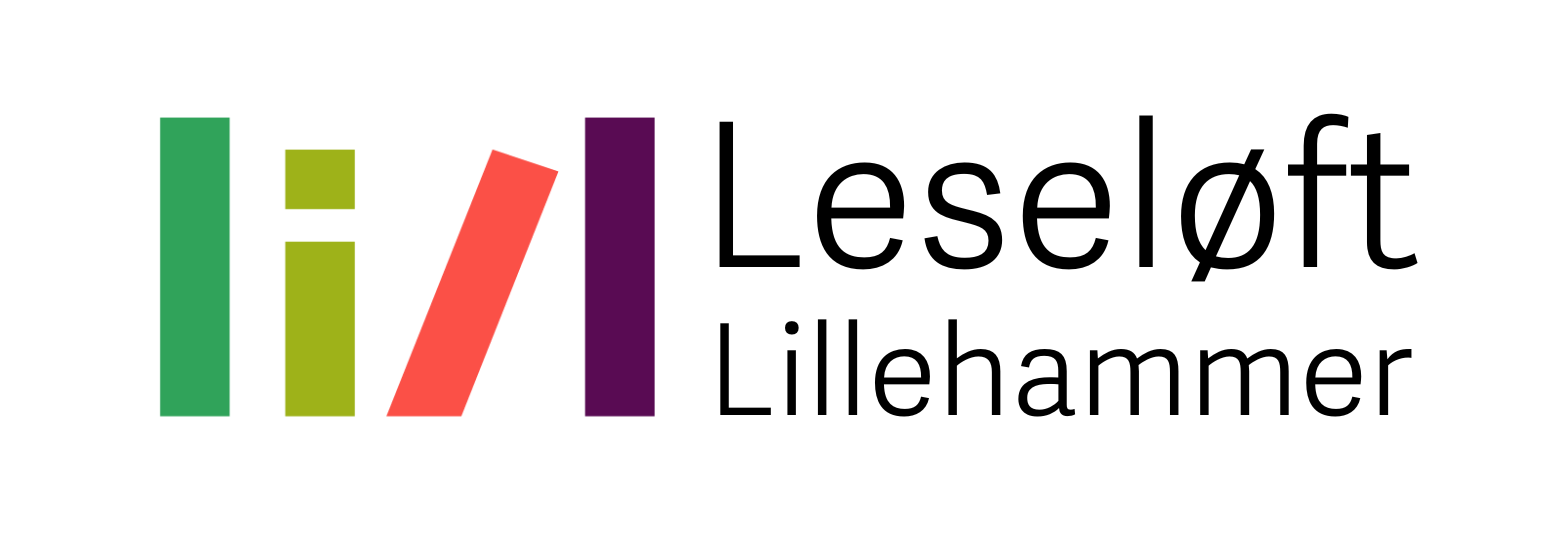Reading boost Lillehammer
– long-term, coordinated and knowledge-based
High reading competence increases the chances of a good life and active participation in society. Strengthening efforts to promote reading is a prerequisite for safeguarding democracy. At a time when reading motivation and skills among children and youth in Norway are declining, Lillehammer stands out positively as a spearhead city for reading, where targeted efforts have reversed the trend.
Reading Boost Lillehammer was politically adopted in May 2024 and builds on long-standing collaboration between Lillehammer schools, Lillehammer Public Library, the Norwegian Festival of Literature, World Expression Forum, Innlandet County Library, and “The Cultural Schoolbag” (Den kulturelle skolesekken). As the initiative has grown stronger and more coordinated, results in national reading tests among students in Lillehammer schools have significantly improved, both compared to previous years and the national average. Particularly important is the reduction in the number of students performing at the lowest level.
Reading Boost Lillehammer aims to:
- Strengthen local collaboration
- Improve the quality of reading education and pupil outcomes
- Develop civic skills
- Collaborate with relevant research environments
- Serve as a model for reading promotion nationally and internationally
Our experience shows that collaboration and coordinated efforts among stakeholders positively impact students’ reading skills and engagement with literature and freedom of expression.
Promoting reading is essential for preserving and further developing democracy. Reading must be defined broadly, encompassing reading experiences, skills, source criticism, interpretation, and reflection. It should also include various formats such as text, audio, and images. The goal is not just to read, but to be able to find information and develop knowledge, ideas, and imagination.
Methods and measures
We know a great deal about what creates strong readers. That’s why Reading Boost Lillehammer applies different approaches at different stages of children’s and young people’s development. Our efforts are divided into three main areas:
1. Transition from kindergarten to school and early literacy education: play-based approach
2. Continued reading and writing education in middle school: varied reading strategies and critical reflection
3. Youth: deep reading, source criticism, freedom of expression, and democratic participation
These measures are coordinated to complement and reinforce each other. The most important work takes place in schools, in daily reading instruction, which is strengthened and empowered by contributions from surrounding partners.
Systematic early education as a foundation for reading motivation
A key part of Reading Boost Lillehammer is establishing a solid and safe foundation already in early education. Through a holistic and systematic transition from kindergarten to school, children encounter a school day where play, language, and reading are central. When work on basic skills occurs in a structured and long-term collaboration between kindergarten and school, it provides good conditions for further development.
Systematic education is not just about plans and strategies – it is primarily about what happens daily in our classrooms. Reading motivation and skills are built in the everyday interaction between teacher and student – when language is explored through play, and texts and images spark curiosity. When teachers have access to good tools, shared direction, and support from colleagues, it becomes easier to follow up on students’ needs and progress in a safe and targeted way. Experiences from Lillehammer suggest that such an approach can lead to increased mastery and joy of reading among the youngest students – and that it can have positive and lasting effects over time.
Good reading and writing instruction requires structured and systematic teaching. All teachers are responsible for helping students develop strong reading and writing skills and for fostering joy in reading and writing. For schools in Lillehammer, work on language, reading, and writing skills is part of the overarching goal of increasing learning outcomes for each student. Functional literacy is also important for lifelong learning and for participating actively in society in a critical and reflective manner.
Lillehammer Municipality’s plans for early education and continued reading and writing instruction are tools to ensure high quality in literacy education. They help guide teaching methods supported by recent research in language, reading, and writing instruction. The plan for continued literacy education is designed as a resource for teachers in middle school, supporting reading and writing across all subjects. It continues several learning activities from early education, such as learning strategies, read-aloud sessions, and use of the library. The plan is intended to be integrated into the school’s own learning plans. Resources in the plan are drawn from the Norwegian Writing Centre, Reading Centre, Language Paths (“Språkløyper”), and Statped.
This work is anchored in Lillehammer’s plan for coherence and transition between kindergarten and school.
Strengthening School Libraries and Close Collaboration Between School, Home, and Public Library
Strengthening school libraries and fostering closer collaboration between schools, homes, and public libraries is one of the cornerstones of Reading Boost Lillehammer. Good school libraries help fulfill the goals of the national curriculum and are essential for each student to find books that motivate them to read.
The school library can be the hub of the school’s work on digital competence, source criticism, information retrieval, an expanded concept of text, and reading as a fundamental skill across all subjects. It is therefore not only important to have an updated and appealing physical book collection, but also to prioritize qualified staff for this work.
Reading Boost projects
Children and students in Lillehammer are exposed to reading, literature, and literary encounters. Throughout the year, they are offered a broad and varied program that ensures continuity and maintains a strong focus on reading over time. Books are made available, the dissemination is active, and students experience participation.
Here you can read about our Reading Boost projects and other recommended initiatives:
Tom - vises ikke (lagt for at feltene skal være kollapset by default=
Children's Book Bath
Children’s Book Bath was first held as part of the Pegasus program during the Norwegian Festival of Literature in May 2016. Since then, it has been a regular feature of Pegasus.
The main goal is for children or youth to prepare and conduct a literary conversation with an author. Before the conversation, the class explores a selected book in depth. They read, wonder, reflect, ask questions, and approach the text openly and critically. Together, the students create questions to ask the author. Each class selects a representative to participate in the conversation with the author and students from other schools.
Through this method, children become familiar with the book, its cover, genre, narrative techniques, characters, and plot. This thorough work provides a solid and safe platform for formulating questions for the author meeting. The reading and conversation help students understand how literature can be both a reading experience and a conversation starter with peers and authors. The project promotes participation and gives young readers ownership of literature.
Lillehammer Municipality’s school office regularly offers training in the Children’s Book Bath method for teachers in primary and lower secondary schools. Participants can then implement book baths as part of the Pegasus year-round program in collaboration with Lillehammer Library and during the Norwegian Festival of Literature.
Interest in this method has steadily increased since its inception in 2016. More municipalities and counties are offering training and organizing literary conversations between young readers and authors. The method holds great potential as a tool for dissemination and motivation for youth engagement and dialogue about literature.
Book Play (Boklek)
Book Play has been running in Innlandet County since 2014 and is a collaboration between the Norwegian Festival of Literature, Innlandet County Library, and all public libraries in the county. Since the project began, 80–90% of children starting school in Innlandet have participated. Book Play highlights different ways into books and creates positive literary experiences through play-based reading.
Each year, an illustrated children’s book is selected and presented to school starters at all public libraries in Innlandet by the illustrator/author and two experienced storytellers. These three divide the tour among themselves in March, April, and May. Children experience Book Play at their local library, and kindergartens receive a copy of the book. Additional activities are developed for the selected book, which kindergartens can use before and after the library visit.
The Norwegian Festival of Literature has long worked to make Book Play a national project. In 2024, it was established in Rogaland, and from 2025 in Telemark and Østfold. Buskerud and Akershus will follow in the coming years. The goal is for all counties in Norway to offer Book Play to school starters.
The expansion has worked well and builds on existing infrastructure: the Norwegian Festival of Literature owns the project and collaborates with county libraries, while public libraries serve as local hosts.
In 2025, we are working with Innlandet County Library to give all first-grade students in Innlandet the Book Play book as a gift and transition object. This way, children encounter the same book in their final kindergarten year and first school year, making literature a shared reference point.
Reading Quarter +
Reading Quarter+ is a methodology developed and made available by Lillehammer Library as part of Reading Boost. It is designed for middle and lower secondary school. In Reading Quarter+, silent reading is reinforced through various activities and supportive measures, aiming for continuity and a reading community. To increase reading joy, the following elements are emphasized:
- Time to read (a little every day)
- Access to books (that match individual interests)
- Reading community (class or family)
- Reading role models (who talk about what they read and show curiosity about what children and youth read)
This school year, all Lillehammer schools are implementing Reading Quarter+ in collaboration with the public library. Schools have set aside daily reading time and ensured access to a wide selection of books through the school library.
Interest in Reading Quarter+ is growing both regionally and nationally. Innlandet County and the LESE Foundation are helping make the method known to teachers and librarians across the country and making materials available to all.
Equal Opportunities
To work systematically and long-term with themes such as freedom of expression, democratic development, and dialogue, Reading Boost Lillehammer has developed a pilot for a three-year teaching program for lower secondary school. The pilot is a collaboration between Lillehammer schools, the school office, the Nansen Center for Peace and Dialogue, World Expression Forum, and others. It aims to give students tools and experiences to participate actively in democracy.
The program teaches students to listen to each other and communicate effectively, and to express their opinions. Long-term engagement is key. By following these themes throughout lower secondary school, students gradually build knowledge and skills. By the end of 10th grade, they will have significantly higher democratic preparedness and a conscious understanding of their freedom of expression.
The most important work happens in the classroom with the teacher. In collaboration with partners, Lillehammer Municipality has developed the teaching program Equal Opportunities, based on core curriculum elements and covering topics such as identity, prejudice, discrimination, and freedom of expression. It consists of five modules:
- From literature to democracy
- Freedom of expression in literature
- Equal opportunities for all
- Equal opportunities to express oneself
- The voice of freedom of expression in literature and music
The modules can be used at all grade levels, either as a complete program or as individual elements. They can be revisited throughout the year or used as preparation or follow-up to activities and themes. The goal is to integrate democracy and freedom of expression into the school’s daily operations and curriculum.
Classroom teaching alone is not always enough to engage youth. Therefore, the initiative’s partners have developed a program with annual activities for all grade levels. These activities aim to inspire and supplement regular teaching.
The Nansen Center visits all grades with a program of exercises, teaching, and dialogue about disagreement. The goal is to prepare students to participate in society with their own opinions. Students learn to handle different types of disagreement and focus on the difference between debate and dialogue, emphasizing active listening and understanding others.
An annual activity for all grades is a half-day visit to the freedom of expression festival WEXFO Youth Voices, held in Lillehammer in May/June in connection with the World Expression Forum. The festival motivates young people to engage in dialogue about freedom of expression. Through workshops, seminars, and activities, it offers a platform for youth to share perspectives, improve communication skills, and connect with peers and experts. The program fosters a supportive environment where youth can explore and advocate for their rights to freedom of expression, contributing to a more inclusive and democratic society. Each class receives a tailored half-day program on a topic of interest, designed by a youth group with representatives from participating schools.
Pegasus
Pegasus is the Norwegian Festival of Literature’s initiative for children and youth. The festival takes place in May/June each year and includes nearly 100 events for children in kindergarten, primary, and secondary school. In addition to the extensive festival program, Pegasus runs a year-round program in collaboration with Lillehammer Library and a nonfiction initiative with Innlandet County Library and The Cultural Schoolbag Innlandet.
Straight to the Point – Nonfiction Encounters with Youth
Nonfiction can increase reading engagement and societal interest among youth. Many Norwegian authors write excellent nonfiction and are skilled at presenting their topics. Literary encounters with youth can improve knowledge, foster dialogue, and enhance source criticism and understanding.
To promote nonfiction among youth in Innlandet, Innlandet County Library and the Norwegian Festival of Literature launched the project Straight to the Point in autumn 2025. Four nonfiction authors toured all public libraries in the county. In addition, The Cultural Schoolbag Innlandet purchased the selected titles for school libraries and organized training in student-led book baths for teachers. Together, these efforts ensure that youth have access to books and opportunities to meet authors for in-depth conversations.
Other recommended initiatives
Tom - vises ikke (lagt for at feltene skal være kollapset by default=
The Book Devourer Price (Bokslukerprisen)
The Book Devourer Price (Bokslukerprisen)is a reading promotion prize for middle school organized by the LESE Foundation. Participating students receive an anthology with excerpts from ten books. In the fall, they read and vote for their favorites. The top five become finalists, read by jury classes across Norway, and the winner is announced on World Book Day in April.
Schools in Lillehammer and Innlandet are encouraged to register at the start of the school year. Participating schools may apply for a spot on the Book Devourer Bus to the Norwegian Festival of Literature, where selected classes attend Pegasus events featuring two finalists.
Summer Reading (Sommerles)
The Uprisen Award
Established in 2007 by the Norwegian Festival of Literature and the LESE Foundation (formerly Foreningen !les), Uprisen is Norway’s most important award for young adult fiction. Today, it is a collaboration between LESE, The Cultural Schoolbag, and the Norwegian Festival of Literature. LESE administers the prize, The Cultural Schoolbag recruits jury classes, and the festival hosts the award ceremony.
All jury classes and nominated authors attend the festival. The day before the ceremony, students meet the authors for literary conversations. The award is presented in Maihaugsalen during the festival’s youth show.
Results and research
Reading surveys show declining trends
- A 2023 study by the National Reading Centre in Norway shows that one in three parents read few or no books to their children. The 2024 Reading Survey confirms this trend: fewer parents read aloud, though those who do read more often. The gap between children is growing.
- PIRLS (Progress in International Reading Literacy Study) measures reading skills among 10-year-olds every five years. The 2021 results show Norwegian students read significantly worse than in 2016 and have the lowest reading enjoyment among 65 countries.
- The 2022 PISA survey shows Norwegian 15-year-olds read worse than five years ago.



Relevant research on what creates good readers
Play-based approaches and read-aloud sessions are important for engaging children in reading. Researchers evaluating the six-year school reform found more focus on academic learning than free play and less time for reading aloud.
In the Children’s Book Bath, classes read the selected book aloud, ensuring all students engage with the same text and can share their reflections. A study from the National Reading Centre suggests teachers are less likely to let struggling readers talk about their experiences compared to strong readers.
Reading aloud tends to decline with age, but research shows that even teenagers enjoy being read to. Many youth are also engaged by challenging literature.
The Norwegian Directorate for Education has summarized research on reading instruction and what improves motivation.
International research
Olle Nordberg from Uppsala University emphasizes the importance of literary conversations in schools.
The Ljubljana Reading Manifesto highlights that reading must include skills such as interpretation, evaluation, and source criticism. The goal is not just to read, but to find information, knowledge, ideas, and valuable reflections.
International collaboration
In the planned Democracies Depend on Reading (DemRead) project, Lillehammer is one of the first five “Spearhead Cities,” alongside Ljubljana (Slovenia), Perugia (Italy), Segovia (Spain), and the Mainz region (Germany). The network will expand nationally and internationally in the coming years. The Reading Boost Lillehammer model will serve as the organizational foundation.
Two sub-projects are planned to start in 2026:
- DemRead Research: a major research project applying for EU Horizon funding
- DemRead Boost: a youth project developing four activities to promote reading and civic engagement among youth, applying for Erasmus+ funding
Both projects target ages 13–29 due to funding criteria. A similar initiative for ages 0–13 is planned from 2027.
In DemRead Research, World Expression Forum (WEXFO) coordinates research activities and parts of the communication work.
WEXFO also leads DemRead Boost, responsible for building the collaboration model in each spearhead city and coordinating the network. WEXFO will further develop the Equal Opportunities activity and lead key communication efforts.
